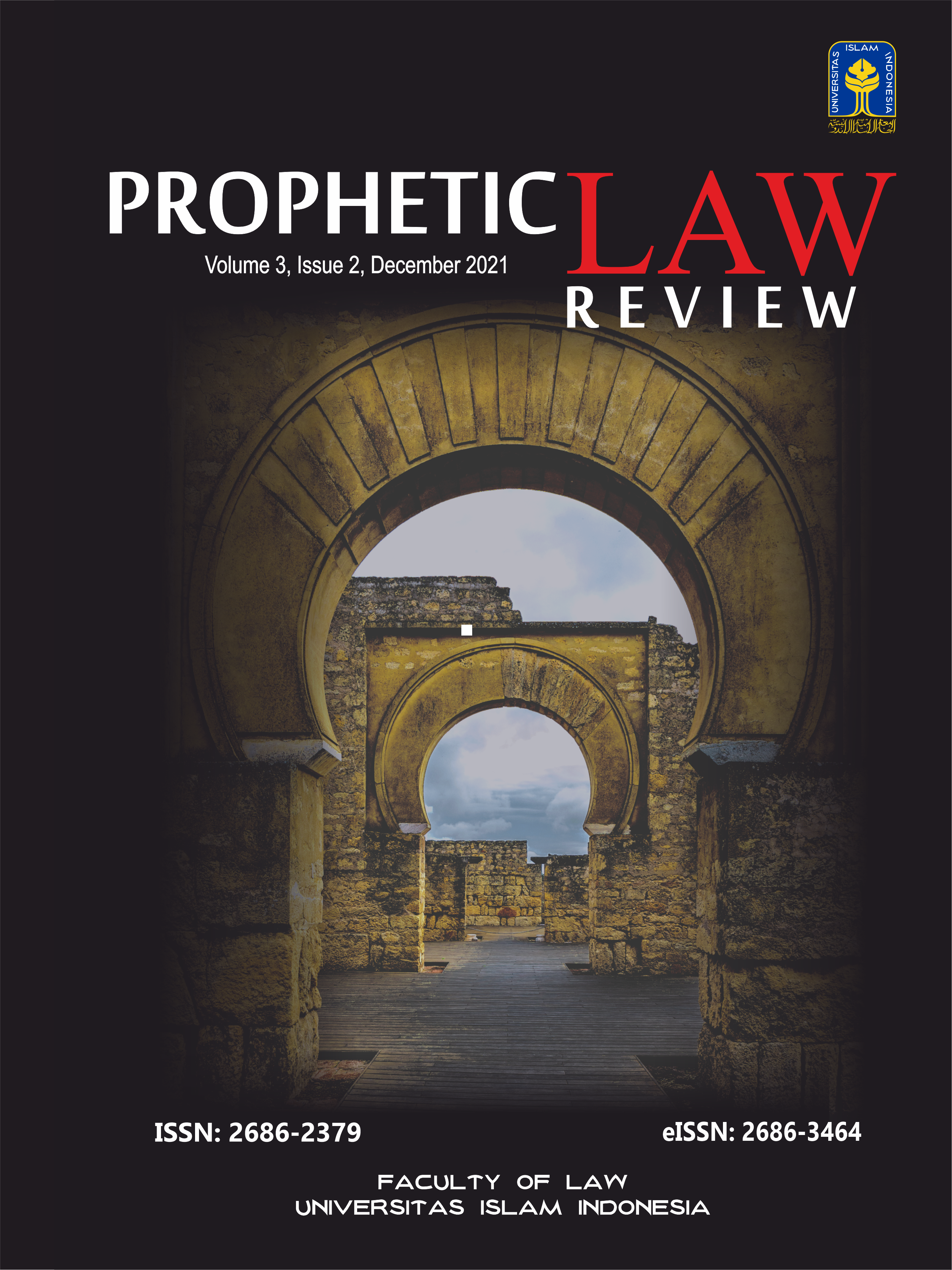Main Article Content
Abstract
Crime of frauds are like an iceberg that always appears till the digital era (such First Travel case). In fact, it is a classic crime since (1915-1918) when ‘the Nederlandsch-Indie Criminal Code’ was enacted. Today, the criminal and penal statutes and their application reflected in Article 378 of the Criminal Code are considered to cause systematic injustice, loss, and suffering, especially for the victims. Then this article needs to be reformulated under the problem formulation "how to reformulate the crime of fraud in Article 378 of the Criminal Code based on restorative justice value?" which is considered more pro-Pancasila values and the victims. As literature research, various legal materials from primary, secondary and tertiary are analyzed descriptively qualitatively. At last, the researcher concludes that a restorative reformulation of crime of fraud in Article 378 of the Criminal Code can be done through a value and policy reorientation by embodying various basic assumptions and the concept of restorative justice in the new article formulation, either by enacting it as a ‘klachtdelict’, especially in the Criminal Code; or embodying restorative sanctions, such as compensation in the penal formulation of the Article. Because it recognizes the harms and needs of the offender and the victims, unity in their relationship, deliberations - dialogue in their process, and forgiveness - peacemaking in their decisions as part of restorative justice values of Indonesians based on Pancasila.
Keywords: Reformulation; Fraud; Policy; Restorative Justice
Reformulasi Tindak Pidana Penipuan Berdasarkan Pasal 378 KUHP Berdasarkan Nilai-nilai Restorative Justice
Abstrak
Kejahatan penipuan layaknya gunung es yang selalu muncul hingga era digital (seperti kasus First Travel). Bahkan, menjadi kejahatan klasik sejak (1915-1918) ketika 'Nederlandsch-Indie Criminal Code' diundangkan. Saat ini, ketentuan hukum pidana dan acara pidana serta penerapannya, yang tercermin dalam Pasal 378 KUHP, dianggap telah menimbulkan ketidakadilan, kerugian, dan penderitaan yang sistematis, terutama bagi para korban. Maka pasal ini perlu dirumuskan kembali dengan rumusan masalah “bagaimana merumuskan kembali tindak pidana penipuan dalam Pasal 378 KUHP berdasarkan nilai keadilan restoratif?” yang dinilai lebih pro-Pancasila dan para korban. Sebagai penelitian kepustakaan, berbagai bahan hukum dari primer, sekunder dan tersier dianalisis secara deskriptif kualitatif. Akhirnya peneliti berkesimpulan bahwa reformulasi restoratif tindak pidana penipuan dalam Pasal 378 KUHP dapat dilakukan melalui reorientasi nilai dan kebijakan dengan mewujudkan berbagai asumsi dasar dan konsep restorative justice dalam rumusan pasal baru, baik dengan memberlakukan itu sebagai 'klachtdelict', khususnya dalam KUHP; atau mewujudkan sanksi restoratif, seperti kompensasi dalam rumusan pidana Pasal tersebut. Karena mengakui kerugian dan kebutuhan pelaku dan korban, persatuan dalam hubungan mereka, musyawarah - dialog dalam proses mereka, dan pengampunan - perdamaian dalam keputusan mereka sebagai bagian dari nilai-nilai keadilan restoratif bangsa Indonesia berdasarkan Pancasila.
Kata Kunci: Reformulasi; Penipuan; Kebijakan; Restorative Justice
Keywords
Article Details
Authors who publish with this journal agree to the following terms:
a. Authors retain copyright and grant the journal right of first publication with the work simultaneously licensed under a Creative Commons Attribution License that allows others to share the work with an acknowledgement of the work's authorship and initial publication in this journal.
b. Authors are able to enter into separate, additional contractual arrangements for the non-exclusive distribution of the journal's published version of the work (e.g., post it to an institutional repository or publish it in a book), with an acknowledgement of its initial publication in this journal.
c. Authors are permitted and encouraged to post their work online (e.g., in institutional repositories or on their website) prior to and during the submission process, as it can lead to productive exchanges, as well as earlier and greater citation of published work (See The Effect of Open Access).
References
- Bills
- Parlement and the Ministry of Law and Human Right, Rancangan Undang-Undang Kitab Undang-Undang Hukum Pidana (RUU KUHP) Draf 2015 dan Rancangan Penjelasannya 2015 (Bill of Criminal Code 2015).
- _______, Rancangan Undang-Undang Kitab Undang-Undang Hukum Pidana (RUU KUHP) Draf September 2019 (Bill of Criminal Code 2019).
- Cases
- Andika Surachman and Anniesa Desvitasari Hasibuan (2018) 83/PidB/2018/PNDpk.
- Andika Surachman and Anniesa Desvitasari Hasibuan (2019) 3096K/PidSus/2018.
- Firts Travel v Customer 105/PdtSus-PKPU/2017/PnJktPst.
- Indonesia Legislations
- Law No. 01 of 1946 on Criminal Code.
- Law No. 08 of 1981 on Criminal Procedure Code (KUHAP 1981).
- Law No. 08 of 2010 on Pencegahan dan Pemberantasan Tindak Pidana Pencucian Uang (PPTPPU) 2010.
- Statutes
- ECOSOC Resolution 2000/14 Basic Principles On The Use of Restorative Justice Programmes In Criminal Matters 2000.
- ECOSOC Resolution 2002 / 12 Basic principles on the use of restorative justice programmes in criminal matters 2002.
References
Bills
Parlement and the Ministry of Law and Human Right, Rancangan Undang-Undang Kitab Undang-Undang Hukum Pidana (RUU KUHP) Draf 2015 dan Rancangan Penjelasannya 2015 (Bill of Criminal Code 2015).
_______, Rancangan Undang-Undang Kitab Undang-Undang Hukum Pidana (RUU KUHP) Draf September 2019 (Bill of Criminal Code 2019).
Cases
Andika Surachman and Anniesa Desvitasari Hasibuan (2018) 83/PidB/2018/PNDpk.
Andika Surachman and Anniesa Desvitasari Hasibuan (2019) 3096K/PidSus/2018.
Firts Travel v Customer 105/PdtSus-PKPU/2017/PnJktPst.
Indonesia Legislations
Law No. 01 of 1946 on Criminal Code.
Law No. 08 of 1981 on Criminal Procedure Code (KUHAP 1981).
Law No. 08 of 2010 on Pencegahan dan Pemberantasan Tindak Pidana Pencucian Uang (PPTPPU) 2010.
Statutes
ECOSOC Resolution 2000/14 Basic Principles On The Use of Restorative Justice Programmes In Criminal Matters 2000.
ECOSOC Resolution 2002 / 12 Basic principles on the use of restorative justice programmes in criminal matters 2002.




